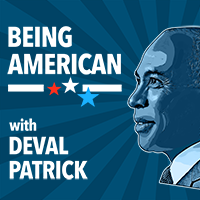Parwez
“America is called the “Land of Opportunity,” and as a immigrant, I am grateful for the opportunities this country has given me to pursue education and professional life.
However for many in this country opportunities are decreasing and becoming harder to achieve. High cost of college, affordable housing, healthcare, and financial security seem out of reach. If Americans can’t afford to live in their own country, where do they go?
Bringing opportunity back to the common person is an endeavor we need to undertake collectively.”
Melissa
“The lack of education and virtue; the cultivated antisocial and anti democratic beliefs and attitudes benefit the unrestrained capitalism and toxic individualism that have exacerbated and justified inequalities and eroded nearly all societal safety nets.
There is a gap between what being American means to me, and where we are. The size of the rift grows with every lie told, with every act to undermine democracy that goes unprosecuted; with every day we disempower citizens economically, educationally, and medically.
I want those we elected to be angry about that; to no longer take no for an answer; to remind those who have forgotten or twisted the meaning of what democracy is; and to hold them accountable for it. The consequences are the lives of real people; of Americans. Americans who want their country to live up to their beliefs about what being American means.”
Gerald
“These days, being an American means living a life of purpose and providing hope to my fellow man; working to make America live up to the Constitution; all men are created equal. I believe in helping each other, living with each other, and standing together, in all times.
That to me is what it means to be American. I am my brother’s keeper.”
Ann
“I am grateful for my ancestors’ bravery in crossing the Atlantic Ocean 200 to 300 years ago. I am grateful for my freedom to worship, to attend college, to choose where I reside, to live in a representative form of government, to read what I want to read, to experience nature, for my husband and me to have raised our children in public schools, for my forefathers who served in the military with the difficult choice to protect their loved ones against harm, to act in ways to support being kind to my neighbors as well as conserving resources, and for a judicial system that allowed me to speak up for people in harm’s way in my health care career.”
Tim
“I am a white, college-educated, 63-year-old, straight male. Last year, I was arrested as part of a peaceful civil disobedience in front of the United States Supreme Court. The issue that day was LBGTQ rights. I, along with my fellow American citizens, made a strong statement that may have swayed Justices Roberts and Kavanaugh to side with giving equal rights to LBGTQ people in the workplace. At that event, I noticed that by being the type of person often associated with the oppressive and unequal system in our country, I can make a valuable statement that may resonate with others in my socio-economic bracket.
All my life, I have seen the damage caused by too much power in the hands of a particular ruling class. This damage is not limited to the oppressed. It is also true for the oppressors. As W.E.B. Dubois noted, the oppressors are almost equally wounded. But their wounds are of the soul and spirit.
I come from a Republican background. But enough is enough. My mother, who had been a member of the Republican Women’s Club in the 1950s, saw the change as well. And at the age of ninety, she wept with joy when Barack Obama was elected in 2008. She was part of the ‘Greatest Generation’ and knew first hand the hazards of tyranny and Fascism.
Being born into a class that is associated with oppression is a burden in itself. I am now committed to giving myself to the cause of fairness and freedom for all in our great country. It is my duty to fight the wrong in my own social class.”
Donna
“Arriving at the MGH in 1968 to complete the RN program, dignity, honor and service to our patients amidst the diversity of iconic Boston and the Vietnam War protests brought together the merging of my inner and more global worlds. Social justice concepts were forming within my complex new world.
When I graduated, I was hired by The Commissioned Corps of the U.S. Public Health Service to work with Navajo people in Gallup, New Mexico, as a new graduate. I began to see the people made invisible to my high school textbooks and I discovered the impact of greed and corporate negligence as I cared for profoundly malnourished, infected 2-year-old patients on my ward. Their mothers, forced to feed their children formula, lived in hogans with no infrastructure, no electricity and no refrigeration.
The next year found me in Los Angeles where I worked for UCLA hospital in both clinical and research areas. Globalization was up close and personal. Within each person I met was a thread we shared: the passion to serve other human beings.
Being an American and a global citizen means that the difficult lessons we learn from this era are never forgotten. Paradigmatic change means that we evolve as strong, resilient, compassionate human beings who are able to set aside old axiomatic thinking that leads to stagnation. The world is calling us to evolve and become kinder, wiser and humble. This is our assignment for this chapter in history.”
